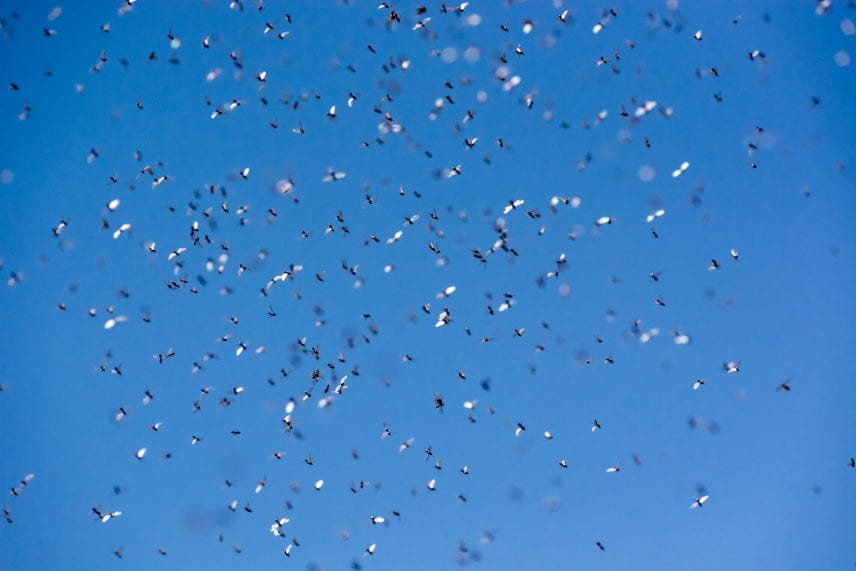Ants are a common pest for homeowners. They can ruin outdoor events and activities while making their way into your home in great numbers. They often gain access through cracks in siding or gaps in doorways and windowsills. Once in, they can be notoriously hard to get rid of and can quickly appear on countertops, tables, floors, or anywhere there are crumbs, spilled liquids, or other food sources. One of the questions clients often ask our pest control experts is about flying ants. In general, these are not a particular species but rather a temporary stage ants go through. If you do notice a large swarm of winged ants at certain places in your home, it could be indicative of a larger problem. The following provides information about these creatures, the damage they could potentially cause, and how we can help you eliminate them.
Ants With Wings
There are a variety of different types of ants that are typically found throughout Pennsylvania, New Jersey, and Delaware. These include common household pests such as odorous house ants, pavement ants, Argentine arts, and thief ants, among others. As a species, none of these are specifically classified as ‘flying ants’, but they often do have winged members within their colonies. These members are born and bred specifically for the purpose of reproducing and forming new colonies. If you happen to see an ant with wings, there is a strong chance they are in the middle of mating season. This tends to happen at the same time each year, usually during warm weather months where there is high humidity and more frequent rains.
During mating season, female ants or ‘queens’ grow wings and fly around, followed by their winged male suitors. Entomologists at Penn State University (PSU) refer to ants in this stage as alates, which means they are sexually mature. You can generally tell when this is happening by the sight of large numbers of ants swarming around your home or yard. Once they have successfully mated, the males die and the queens look for new places to establish their colony. After they have found the perfect spot to build their nests, often in old wood or concrete, the female’s wings get broken off and her days as a flying ant are over.
Can Winged Ants Cause Damage In Your Home?
If you are seeing ants with wings in and around your home, it means you already have one established colony and another on the way. Now is the time to call in our pest control professionals to help locate the nests and eradicate the problem before it becomes worse. Other than populating on your property, winged ants will generally do no more damage than they otherwise would when they do not have their wings. However, there is one species of winged ant that can be particularly problematic, which is carpenter ants.
While carpenter ants aid in the decay of old wood and can often be found nesting in logs and tree stumps, they can end up invading your home in search of a food source. Contrary to the popular myth, carpenter ants do not actually eat wood but burrow through it as they go along their journey and establish their nests. While not as destructive as termites, they can still do damage to wooden structures around your home.
Winged Ants vs. Termites
As they are frequently found in and around decaying wood, carpenter ants are often mistaken for termites. Both are winged creatures which are dark in appearance. However, there are key differences:
- Carpenter ants tend to have longer bodies, which are cinched at the waist;
- Carpenter ants have a hard outer shell, whereas termites have soft bodies;
- Carpenter wings are longer in the front, while termite wings are the same size;
- Carpenter ants have angled antennae, compared to the straight antenna of a termite.
The same as other ant types, not all carpenter ants have wings. Winged carpenter ants are in a reproductive stage, while their wingless counterparts are worker ants whose primary task is gathering food and supplies for the colony.
Schedule A Free Consultation With Pointe Pest Control
Dealing with an ant problem is frustrating for homeowners and nearly impossible to eradicate on your own. Our pest control professionals can identify the types of ants you have while taking the steps needed to eliminate them and keep them from returning. Call one of our local offices or contact Pointe Pest Control online and schedule a free consultation today.


